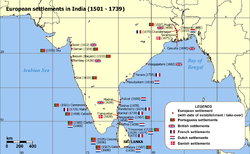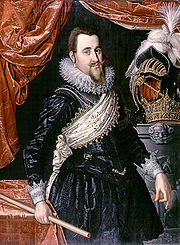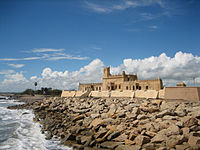- Danish East India Company
-
The Danish East India Company[1] (Danish: Dansk Østindisk Kompagni) was a Danish chartered company.
Contents
History
It was founded in 1616, following a privilege of Danish King Christian IV. It was focused on trade with India and had its base in Tranquebar, in the fort Dansborg, the seat of its governor (see indirect rule) of Danish India, who was styled Opperhoved. During its heyday, the Danish East India Company and Swedish East India Company imported more tea than the British East India Company and smuggled 90 percent of it into Britain, where it could be sold at a huge profit.
After a short blossoming, it lost importance quickly and was dissolved in 1729. In 1730, it was refounded as the Asiatisk Kompagni ("Asiatic Company") and with the royal licence conferred in 1732, the new company was granted a 40-year monopoly on all Danish trade east of the Cape of Good Hope, yet in 1772, it lost its monopoly, and in 1779 Danish India became a crown colony.
During the Napoleonic Wars, in 1801 and again in 1807, the British Navy attacked Copenhagen in the Battle of Copenhagen (1807). As a consequence of the last attack, Denmark (one of few West European countries not occupied by Bonaparte) lost its entire fleet and the island of Helgoland (part of the duchy of Holstein-Gottorp; ceded to Germany in 1890) to Britain. Denmark finally sold its remaining settlements in mainland India in 1845 and the Danish Gold Coast to the British in 1850.
See also
- Tranquebar
- Serampore
- Dansborg
- Frederiksnagore
- Nicobar Islands
- History of India
Notes
Sources and references
- Projekt Runeberg Danish biographical lexicon, in Danish
- Denmark during the Age of the French Revolution, 1790-1814
- WorldStatesmen- India; see also Germany for Helgoland
Danish overseas colonies and territories Former colonies Danish India and
East India Company
Current overseas
territoriesSee also Danish East India Company · Danish West India Company Categories:- Former Danish colonies
- Companies of Denmark
- Colonial Indian companies
- Chartered companies
- Danish rule in India
- 1616 establishments
- Companies established in the 17th century
- Trading companies
- Danish history stubs
- Danish company stubs
Wikimedia Foundation. 2010.



